Multidisciplinary View of the Religious, Spiritual and Esoteric Phenomena
Religion and Sexual Ethics
The Heaven is Hotter than Hell Paradox is a contradiction between stated temputures listed in the Bible. By computing the temputures of both Heaven and Hell using the information by the Bible. Tempurature of Heven The temperature of heaven can be rather accurately computed. Our authority is the Bible, Isaiah 30:26 reads, "Moreover, the light of the moon shall be as the light of the sun and the light of the sun shall be sevenfold as the light of seven days." Tempurature of Hell The exact temperature of hell cannot be computed but it must be less than 444.6C, the temperature at which brimstone or sulfur changes from a liquid to a gas. Back to Table of Contents
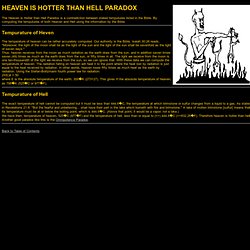
Encyclopedia Uselessia -- Heaven is hotter than Hell Paradox
Religious activities around the world Many religions may have organized behaviors, clergy, a definition of what constitutes adherence or membership, holy places, and scriptures. The practice of a religion may include rituals, sermons, commemoration or veneration (of a deity, gods or goddesses), sacrifices, festivals, feasts, trance, initiations, funerary services, matrimonial services, meditation, prayer, music, art, dance, public service or other aspects of human culture. Etymology Religion (from O.Fr. religion "religious community," from L. religionem (nom. religio) "respect for what is sacred, reverence for the gods,"[11] "obligation, the bond between man and the gods"[12]) is derived from the Latin religiō, the ultimate origins of which are obscure. Many languages have words that can be translated as "religion", but they may use them in a very different way, and some have no word for religion at all. Definitions Theories Origins and development The origin of religion is uncertain.
Religion
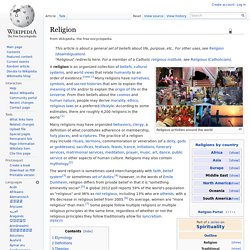
Evolutionary origin of religions
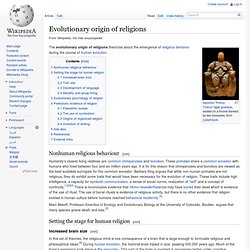 The evolutionary origin of religions theorizes about the emergence of religious behavior during the course of human evolution. Nonhuman religious behaviour[edit] Humanity’s closest living relatives are common chimpanzees and bonobos. These primates share a common ancestor with humans who lived between four and six million years ago. It is for this reason that chimpanzees and bonobos are viewed as the best available surrogate for this common ancestor. Marc Bekoff, Professor Emeritus of Ecology and Evolutionary Biology at the University of Colorado, Boulder, argues that many species grieve death and loss.[5] Setting the stage for human religion[edit] Increased brain size[edit] In this set of theories, the religious mind is one consequence of a brain that is large enough to formulate religious and philosophical ideas.[6] During human evolution, the hominid brain tripled in size, peaking 500,000 years ago. Tool use[edit] Development of language[edit] Morality and group living[edit]
The evolutionary origin of religions theorizes about the emergence of religious behavior during the course of human evolution. Nonhuman religious behaviour[edit] Humanity’s closest living relatives are common chimpanzees and bonobos. These primates share a common ancestor with humans who lived between four and six million years ago. It is for this reason that chimpanzees and bonobos are viewed as the best available surrogate for this common ancestor. Marc Bekoff, Professor Emeritus of Ecology and Evolutionary Biology at the University of Colorado, Boulder, argues that many species grieve death and loss.[5] Setting the stage for human religion[edit] Increased brain size[edit] In this set of theories, the religious mind is one consequence of a brain that is large enough to formulate religious and philosophical ideas.[6] During human evolution, the hominid brain tripled in size, peaking 500,000 years ago. Tool use[edit] Development of language[edit] Morality and group living[edit]
Römische Gottheit
Gottheit nach Kulturkreis
Gottheit
 Info: Dies ist eine Objektkategorie für Artikel, die das Kriterium „ist ein(e) …“ gegenüber dem Kategorienamen erfüllen. Dies gilt auch für sämtliche Artikel in Unterkategorien. Die Einordnung dieser Kategorie ist je nach Regelung des Fachbereichs in Objektkategorien und in Themenkategorien möglich. Unterkategorien Es werden 7 von insgesamt 7 Unterkategorien in dieser Kategorie angezeigt:In Klammern die Anzahl der enthaltenen Kategorien (K), Seiten (S), Dateien (D) Seiten in der Kategorie „Gottheit“ Es werden 15 von insgesamt 15 Seiten in dieser Kategorie angezeigt:
Info: Dies ist eine Objektkategorie für Artikel, die das Kriterium „ist ein(e) …“ gegenüber dem Kategorienamen erfüllen. Dies gilt auch für sämtliche Artikel in Unterkategorien. Die Einordnung dieser Kategorie ist je nach Regelung des Fachbereichs in Objektkategorien und in Themenkategorien möglich. Unterkategorien Es werden 7 von insgesamt 7 Unterkategorien in dieser Kategorie angezeigt:In Klammern die Anzahl der enthaltenen Kategorien (K), Seiten (S), Dateien (D) Seiten in der Kategorie „Gottheit“ Es werden 15 von insgesamt 15 Seiten in dieser Kategorie angezeigt:
Comparative religion
Comparative religion is the branch of the study of religions concerned with the systematic comparison of the doctrines and practices of the world's religions. In general the comparative study of religion yields a deeper understanding of the fundamental philosophical concerns of religion such as ethics, metaphysics and the nature and form of salvation. Studying such material is meant to give one a richer and more sophisticated understanding of human beliefs and practices regarding the sacred, numinous, spiritual and divine.[1] In the field of comparative religion, the main world religions are generally classified as Abrahamic (aka Western Asian or Western), Dharmic (aka Indian) or Taoic (aka East Asian or Far Eastern). Abrahamic or Western Asian religions[edit] The original belief in the One God of Abraham eventually became present-day Rabbinic Judaism. The historical interaction of Islam and Judaism started in the 7th century CE with the origin and spread of Islam. Bahá'í Faith[edit]
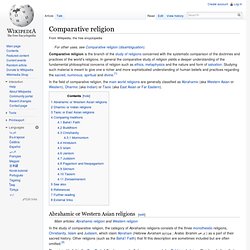
Presbyterianism is a branch of Reformed Protestantism which traces its origins to the British Isles. Presbyterian churches derive their name from the presbyterian form of church government, which is government by representative assemblies of elders. Many Reformed churches are organized this way, but the word "Presbyterian," when capitalized, is often applied uniquely to the churches which trace their roots to the Scottish and English churches that bore that name and English political groups that formed during the Civil War.[1] Presbyterian theology typically emphasizes the sovereignty of God, the authority of the Scriptures, and the necessity of grace through faith in Christ. Presbyterian church government was ensured in Scotland by the Acts of Union in 1707[2] which created the kingdom of Great Britain. The roots of Presbyterianism lie in the European Reformation of the 16th century, with the example of John Calvin's Geneva being particularly influential. History[edit] Governance[edit]
Presbyterianism
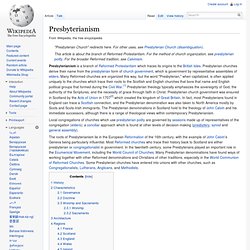
Baptists are individuals who comprise a group of denominations and churches that subscribe to a doctrine that baptism should be performed only for professing believers (believer's baptism, as opposed to infant baptism), and that it must be done by complete immersion (as opposed to affusion or sprinkling). Other tenets of Baptist churches include soul competency (liberty), salvation through faith alone, scripture alone as the rule of faith and practice, and the autonomy of the local congregation. Baptists recognize two ministerial offices, pastors and deacons. Baptist churches are widely considered to be Protestant churches, though some Baptists disavow this identity.[1] Diverse from their beginning, those identifying as Baptists today differ widely from one another in what they believe, how they worship, their attitudes toward other Christians, and their understanding of what is important in Christian discipleship.[2] Origins[edit] English separatist view[edit] Perpetuity view[edit]
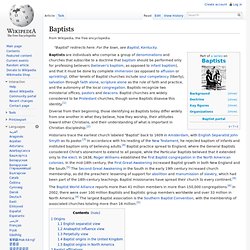
Baptists
Religion
Cette section vous permettra de visiter divers lieux de culte de diverses religions. Plusieurs ont été réalisées par le Service national du RÉCIT au développement de la personne, d'autres se trouvent sur des sites Web. La plupart des visites sont en format Quicktime VR , si vous ne l'avez pas encore installé, vous pourrez le télécharger sur le site de Apple. Bonne visite :-) D'autres sites proposent aussi des visites virtuelles panoramiques dont un bon nombre de lieux de culte : 1001merveilles.org : Sites du patrimoine mondial en panophotographiesviewAt.org : Le monde en panoramiqueGoogle Map et sa fonction « Streetview » pour des panoramas extérieurs

Les visites virtuelles de différents lieux de cultes
 ?אם אין אני לי, מי לי? וכשאני לעצמי, מה אני? ואם לא עכשיו, אימתי « Im ein ani li, mi li ?Oukhchéani lé-atsmi, ma ani ? « Si je ne suis pas pour moi, qui le sera ? Hillel l’Ancien – Pirké Avot, Maximes des Pères – 1:14 Cette maxime qui symbolise bien l’action des aînés au sein du mouvement scout en général et des EEIF en particulier est la raison d’être de ce site : mettre à la disposition de tous les cheftaines et chefs scouts ce que j’ai pu glaner ici et là dans ma vie scoute et qui me sert encore aujourd’hui. Des enseignements qui sont autant de richesses pour mieux éclairer et enrichir notre mission : être de véritables « animateurs scouts » en donnant encore plus de vie, de souffle, d’esprit, encore plus d’âme à notre action au service des jeunes générations. Hocco N’hésitez pas à m’indiquez par mail d’éventuelles erreurs ou problèmes de lecture.
?אם אין אני לי, מי לי? וכשאני לעצמי, מה אני? ואם לא עכשיו, אימתי « Im ein ani li, mi li ?Oukhchéani lé-atsmi, ma ani ? « Si je ne suis pas pour moi, qui le sera ? Hillel l’Ancien – Pirké Avot, Maximes des Pères – 1:14 Cette maxime qui symbolise bien l’action des aînés au sein du mouvement scout en général et des EEIF en particulier est la raison d’être de ce site : mettre à la disposition de tous les cheftaines et chefs scouts ce que j’ai pu glaner ici et là dans ma vie scoute et qui me sert encore aujourd’hui. Des enseignements qui sont autant de richesses pour mieux éclairer et enrichir notre mission : être de véritables « animateurs scouts » en donnant encore plus de vie, de souffle, d’esprit, encore plus d’âme à notre action au service des jeunes générations. Hocco N’hésitez pas à m’indiquez par mail d’éventuelles erreurs ou problèmes de lecture.
Emmanuel le petit protestant, son histoire
Une religion est une manière d’envisager la relation entre les hommes et le divin (Un ou plusieurs), une façon aussi de concevoir le monde et de répondre aux grandes questions existentielles (d’où venons-nous, pourquoi existons-nous, où allons-nous après la mort, y a-t-il un Dieu qui s’intéresse à nous…). C’est enfin également une manière de vivre, qui découle des croyances et du mode d’expression de celles-ci. Vidéo : expansion des religions à travers les siècles : Christianisme : Jésus, Juif né en Israël. Judaïsme : Le judaïsme plonge ses racines dans la lignée d’un homme, Abraham (vers 2000 av. Islam : Muhammad (Mohammed) (ou Mahomet, en Français). Hindouisme : On ne connaît pas l’origine de cette religion complexe. Bouddhisme : Siddhartha Gautama, appelé plus tard Bouddha, né vers 560 av.J.C. en Inde. Christianisme : Yahvé – prononciation de l’Hébreu YHWH, Dieu unique, créateur du monde, tout-puissant et saint (c’est-à-dire sans mal). Islam : L’homme a été créé par Allah.

Les 5 grandes religions comparées • atoi2voir
Infantil | Aula de Reli
semana_santa_y_los_ninyos
Historias de la Biblia – Infantil 5 años Fuente: Editorial Edelvives ÍNDICE: 1. María visita a Isabel (Visitación)………………..Página 7 2. Nacimiento de Jesús (Navidad)…………………Página 13 3. Los Magos de Oriente (Epifanía)………………Página 19 4. Canción – Mis dos mamás – Virgen María Durante este mes de mayo, mes de la Virgen María nuestra “mami del cielo”, los alumnos de Infantil realizan diferentes trabajos sobre nuestras dos mamás y sobre la familia. Manualidad – Día de la Madre Les propongo una manualidad sencilla para realizar en casa y regalarla a mamá en el día de las madres. Publicado en 1º Primaria, 2º Primaria, 4 años, 5 años, Infantil, Primaria, Primer Ciclo Etiquetado Día de la madre, Dibujos para colorear, Flores, Manualidades, molde, recortable Cuidamos la naturaleza – Infantil Este mes de noviembre aprendemos a ver la naturaleza como regalo de Dios. Creación de herramientas online El Arca de Noé Canción – El amor de Dios es maravilloso ¡El amor de Dios es maravilloso!
5 años | Blog de los Recursos de JESUS MARIA
Re begreppsträd
Upload Studi.se Studi.se Loading... Working... ► Play all Religion - Studi.se Studi.se18 videos32,019 viewsLast updated on Apr 2, 2014 Play all Sign in to YouTube Sign in History Sign in to add this to Watch Later Add to Loading playlists...
Religion - Studi.se
Ord och begrepp - sfgr-sarasvensson-so
Här är en lista på ord och begrepp som ni stött på under lektionerna om Judendom, Kristendom, Islam, Hinduism och Buddism Abrahamitiska religioner: Islam, Judendom och Kristendom. Tre religioner som alla har samma "urfader" Abraham. Dessa religioner har också gemensamma n Diaspora: Judarna kunde inte bo kvar i Kanaans land och flydde/flyttade ut till länder i Europa och Asien. Monoteistisk religion: En religion där man tror på EN gud. Antisemitism: När man tycker illa om judar. Ghetto: Ett område/kvarter i en stad där bara judar bo. Konvertera: Byta religion. Pogrom: Angrepp på judar där man gick samman och förstörde deras saker och misshandlade eller t.o.m. dödade dem. Kibbutz: Kollektiva jordbruk som invandrade judar startade i Palestina/Israel. Synagoga: Judarnas heliga rum, deras tempel där man har gudstjänst. Rabbin: Den som leder gudstjänst, den judiska "prästen". Bar/bat mitzva: Ungdomar går och lär sig om judendom och gör sedan en slags "examen", sedan betraktas man som vuxen.
Mieux comprendre les rites, cultures et croyances
Dans son livre « Guide des rites, cultures et croyances à l'usage des soignants », Isabelle Lévy fait le point sur les traditions rituelles des religions et des cultures. Un ouvrage indispensable pour le soignant qui souhaite améliorer l'accompagnement et les soins prodigués dans le respect des croyances de l'autre. Même s'il est interdit de notifier la religion d'un patient dans son dossier médical, il est nécessaire que le soignant soit informé de ses croyances et pratiques afin d'appréhender ses besoins. Pour mieux comprendre les traditions rituelles des religions et des cultures et ainsi mieux prendre soin, Isabelle Lévy, conférencière et formatrice autour des rites, cultures et religions en milieu hospitalier, consigne dans son ouvrage les principes à connaître. Le « Guide des rites, cultures et croyances à l'usage des soignants » s'adresse aussi bien aux croyants qu'aux athées ou agnostiques et offre un large panorama des doctrines existant à travers le monde, mais pas que.
A l'époque classique, la vie religieuse est un des éléments de la vie civique. Les liens religieux sont le ciment le plus solide de l'Etat, comme ils le sont de la famille; aussi n'y a-t-il pas de religion qui ne soit la religion de l'Etat; les cérémonies, où se rassemblent tous les habitants de la cité, sont célébrées par des magistrats et non par un clergé professionnel. Les dieux, en effet, servent à défendre la cité contre ses ennemis; ce sont des divinités locales, qui n'ont d'autre fonction que de secourir l'Etat, dont ils sont membres, et leur nom d'Apollon, Athéna, Poséidon... ne doit pas faire oublier que l'unification du panthéon n'a jamais été que superficielle. Aussi le sentiment religieux se confond-il avec le patriotisme. Sacrifice à Jupiter N. Coypel ©musée du château de Versailles Une telle foi ne pouvait longtemps contenter les fidèles. Dès le IVe siècle, le déclin du pouvoir politique, les échecs de la cité portèrent de rudes coups à la religion civique. Les sources
Religion grecque antique
Religion grecque antique
Religion grecque antique (notions)
unnamed pearl
Världsreligionerna del 1
Fanns Jesus? | Historiebloggen | SvD


 Encyclopedia Uselessia -- Heaven is hotter than Hell Paradox
Encyclopedia Uselessia -- Heaven is hotter than Hell Paradox

 The evolutionary origin of religions theorizes about the emergence of religious behavior during the course of human evolution. Nonhuman religious behaviour[edit] Humanity’s closest living relatives are common chimpanzees and bonobos. These primates share a common ancestor with humans who lived between four and six million years ago. It is for this reason that chimpanzees and bonobos are viewed as the best available surrogate for this common ancestor. Marc Bekoff, Professor Emeritus of Ecology and Evolutionary Biology at the University of Colorado, Boulder, argues that many species grieve death and loss.[5] Setting the stage for human religion[edit] Increased brain size[edit] In this set of theories, the religious mind is one consequence of a brain that is large enough to formulate religious and philosophical ideas.[6] During human evolution, the hominid brain tripled in size, peaking 500,000 years ago. Tool use[edit] Development of language[edit] Morality and group living[edit]
The evolutionary origin of religions theorizes about the emergence of religious behavior during the course of human evolution. Nonhuman religious behaviour[edit] Humanity’s closest living relatives are common chimpanzees and bonobos. These primates share a common ancestor with humans who lived between four and six million years ago. It is for this reason that chimpanzees and bonobos are viewed as the best available surrogate for this common ancestor. Marc Bekoff, Professor Emeritus of Ecology and Evolutionary Biology at the University of Colorado, Boulder, argues that many species grieve death and loss.[5] Setting the stage for human religion[edit] Increased brain size[edit] In this set of theories, the religious mind is one consequence of a brain that is large enough to formulate religious and philosophical ideas.[6] During human evolution, the hominid brain tripled in size, peaking 500,000 years ago. Tool use[edit] Development of language[edit] Morality and group living[edit]
 Info: Dies ist eine Objektkategorie für Artikel, die das Kriterium „ist ein(e) …“ gegenüber dem Kategorienamen erfüllen. Dies gilt auch für sämtliche Artikel in Unterkategorien. Die Einordnung dieser Kategorie ist je nach Regelung des Fachbereichs in Objektkategorien und in Themenkategorien möglich. Unterkategorien Es werden 7 von insgesamt 7 Unterkategorien in dieser Kategorie angezeigt:In Klammern die Anzahl der enthaltenen Kategorien (K), Seiten (S), Dateien (D) Seiten in der Kategorie „Gottheit“ Es werden 15 von insgesamt 15 Seiten in dieser Kategorie angezeigt:
Info: Dies ist eine Objektkategorie für Artikel, die das Kriterium „ist ein(e) …“ gegenüber dem Kategorienamen erfüllen. Dies gilt auch für sämtliche Artikel in Unterkategorien. Die Einordnung dieser Kategorie ist je nach Regelung des Fachbereichs in Objektkategorien und in Themenkategorien möglich. Unterkategorien Es werden 7 von insgesamt 7 Unterkategorien in dieser Kategorie angezeigt:In Klammern die Anzahl der enthaltenen Kategorien (K), Seiten (S), Dateien (D) Seiten in der Kategorie „Gottheit“ Es werden 15 von insgesamt 15 Seiten in dieser Kategorie angezeigt:


 Baptists
Baptists
 Les visites virtuelles de différents lieux de cultes
Les visites virtuelles de différents lieux de cultes
 ?אם אין אני לי, מי לי? וכשאני לעצמי, מה אני? ואם לא עכשיו, אימתי « Im ein ani li, mi li ?Oukhchéani lé-atsmi, ma ani ? « Si je ne suis pas pour moi, qui le sera ? Hillel l’Ancien – Pirké Avot, Maximes des Pères – 1:14 Cette maxime qui symbolise bien l’action des aînés au sein du mouvement scout en général et des EEIF en particulier est la raison d’être de ce site : mettre à la disposition de tous les cheftaines et chefs scouts ce que j’ai pu glaner ici et là dans ma vie scoute et qui me sert encore aujourd’hui. Des enseignements qui sont autant de richesses pour mieux éclairer et enrichir notre mission : être de véritables « animateurs scouts » en donnant encore plus de vie, de souffle, d’esprit, encore plus d’âme à notre action au service des jeunes générations. Hocco N’hésitez pas à m’indiquez par mail d’éventuelles erreurs ou problèmes de lecture.
Emmanuel le petit protestant, son histoire
?אם אין אני לי, מי לי? וכשאני לעצמי, מה אני? ואם לא עכשיו, אימתי « Im ein ani li, mi li ?Oukhchéani lé-atsmi, ma ani ? « Si je ne suis pas pour moi, qui le sera ? Hillel l’Ancien – Pirké Avot, Maximes des Pères – 1:14 Cette maxime qui symbolise bien l’action des aînés au sein du mouvement scout en général et des EEIF en particulier est la raison d’être de ce site : mettre à la disposition de tous les cheftaines et chefs scouts ce que j’ai pu glaner ici et là dans ma vie scoute et qui me sert encore aujourd’hui. Des enseignements qui sont autant de richesses pour mieux éclairer et enrichir notre mission : être de véritables « animateurs scouts » en donnant encore plus de vie, de souffle, d’esprit, encore plus d’âme à notre action au service des jeunes générations. Hocco N’hésitez pas à m’indiquez par mail d’éventuelles erreurs ou problèmes de lecture.
Emmanuel le petit protestant, son histoire
 Les 5 grandes religions comparées • atoi2voir
Les 5 grandes religions comparées • atoi2voir